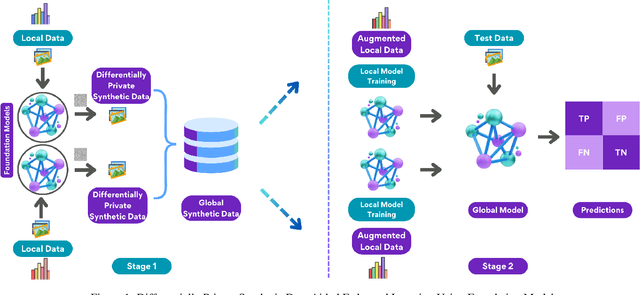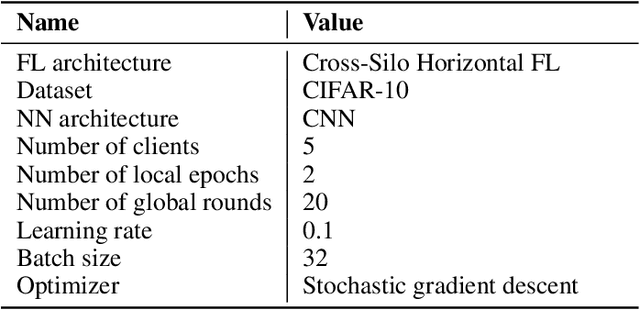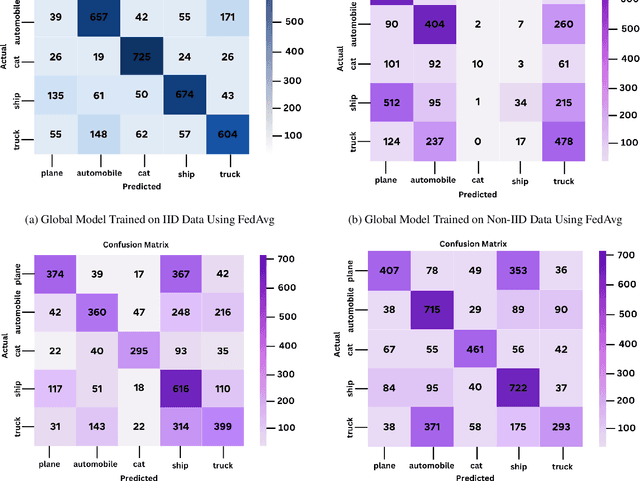Mustafa A. Mustafa
Defending the Edge: Representative-Attention for Mitigating Backdoor Attacks in Federated Learning
May 15, 2025Abstract:Federated learning (FL) enhances privacy and reduces communication cost for resource-constrained edge clients by supporting distributed model training at the edge. However, the heterogeneous nature of such devices produces diverse, non-independent, and identically distributed (non-IID) data, making the detection of backdoor attacks more challenging. In this paper, we propose a novel federated representative-attention-based defense mechanism, named FeRA, that leverages cross-client attention over internal feature representations to distinguish benign from malicious clients. FeRA computes an anomaly score based on representation reconstruction errors, effectively identifying clients whose internal activations significantly deviate from the group consensus. Our evaluation demonstrates FeRA's robustness across various FL scenarios, including challenging non-IID data distributions typical of edge devices. Experimental results show that it effectively reduces backdoor attack success rates while maintaining high accuracy on the main task. The method is model-agnostic, attack-agnostic, and does not require labeled reference data, making it well suited to heterogeneous and resource-limited edge deployments.
Synthetic Data Aided Federated Learning Using Foundation Models
Jul 06, 2024



Abstract:In heterogeneous scenarios where the data distribution amongst the Federated Learning (FL) participants is Non-Independent and Identically distributed (Non-IID), FL suffers from the well known problem of data heterogeneity. This leads the performance of FL to be significantly degraded, as the global model tends to struggle to converge. To solve this problem, we propose Differentially Private Synthetic Data Aided Federated Learning Using Foundation Models (DPSDA-FL), a novel data augmentation strategy that aids in homogenizing the local data present on the clients' side. DPSDA-FL improves the training of the local models by leveraging differentially private synthetic data generated from foundation models. We demonstrate the effectiveness of our approach by evaluating it on the benchmark image dataset: CIFAR-10. Our experimental results have shown that DPSDA-FL can improve class recall and classification accuracy of the global model by up to 26% and 9%, respectively, in FL with Non-IID issues.
Proactive Load-Shaping Strategies with Privacy-Cost Trade-offs in Residential Households based on Deep Reinforcement Learning
May 29, 2024



Abstract:Smart meters play a crucial role in enhancing energy management and efficiency, but they raise significant privacy concerns by potentially revealing detailed user behaviors through energy consumption patterns. Recent scholarly efforts have focused on developing battery-aided load-shaping techniques to protect user privacy while balancing costs. This paper proposes a novel deep reinforcement learning-based load-shaping algorithm (PLS-DQN) designed to protect user privacy by proactively creating artificial load signatures that mislead potential attackers. We evaluate our proposed algorithm against a non-intrusive load monitoring (NILM) adversary. The results demonstrate that our approach not only effectively conceals real energy usage patterns but also outperforms state-of-the-art methods in enhancing user privacy while maintaining cost efficiency.
Privacy-Preserving Distributed Learning for Residential Short-Term Load Forecasting
Feb 02, 2024



Abstract:In the realm of power systems, the increasing involvement of residential users in load forecasting applications has heightened concerns about data privacy. Specifically, the load data can inadvertently reveal the daily routines of residential users, thereby posing a risk to their property security. While federated learning (FL) has been employed to safeguard user privacy by enabling model training without the exchange of raw data, these FL models have shown vulnerabilities to emerging attack techniques, such as Deep Leakage from Gradients and poisoning attacks. To counteract these, we initially employ a Secure-Aggregation (SecAgg) algorithm that leverages multiparty computation cryptographic techniques to mitigate the risk of gradient leakage. However, the introduction of SecAgg necessitates the deployment of additional sub-center servers for executing the multiparty computation protocol, thereby escalating computational complexity and reducing system robustness, especially in scenarios where one or more sub-centers are unavailable. To address these challenges, we introduce a Markovian Switching-based distributed training framework, the convergence of which is substantiated through rigorous theoretical analysis. The Distributed Markovian Switching (DMS) topology shows strong robustness towards the poisoning attacks as well. Case studies employing real-world power system load data validate the efficacy of our proposed algorithm. It not only significantly minimizes communication complexity but also maintains accuracy levels comparable to traditional FL methods, thereby enhancing the scalability of our load forecasting algorithm.
QNNRepair: Quantized Neural Network Repair
Jun 27, 2023



Abstract:We present QNNRepair, the first method in the literature for repairing quantized neural networks (QNNs). QNNRepair aims to improve the accuracy of a neural network model after quantization. It accepts the full-precision and weight-quantized neural networks and a repair dataset of passing and failing tests. At first, QNNRepair applies a software fault localization method to identify the neurons that cause performance degradation during neural network quantization. Then, it formulates the repair problem into a linear programming problem of solving neuron weights parameters, which corrects the QNN's performance on failing tests while not compromising its performance on passing tests. We evaluate QNNRepair with widely used neural network architectures such as MobileNetV2, ResNet, and VGGNet on popular datasets, including high-resolution images. We also compare QNNRepair with the state-of-the-art data-free quantization method SQuant. According to the experiment results, we conclude that QNNRepair is effective in improving the quantized model's performance in most cases. Its repaired models have 24% higher accuracy than SQuant's in the independent validation set, especially for the ImageNet dataset.
A Survey of Safety and Trustworthiness of Large Language Models through the Lens of Verification and Validation
May 19, 2023



Abstract:Large Language Models (LLMs) have exploded a new heatwave of AI, for their ability to engage end-users in human-level conversations with detailed and articulate answers across many knowledge domains. In response to their fast adoption in many industrial applications, this survey concerns their safety and trustworthiness. First, we review known vulnerabilities of the LLMs, categorising them into inherent issues, intended attacks, and unintended bugs. Then, we consider if and how the Verification and Validation (V&V) techniques, which have been widely developed for traditional software and deep learning models such as convolutional neural networks, can be integrated and further extended throughout the lifecycle of the LLMs to provide rigorous analysis to the safety and trustworthiness of LLMs and their applications. Specifically, we consider four complementary techniques: falsification and evaluation, verification, runtime monitoring, and ethical use. Considering the fast development of LLMs, this survey does not intend to be complete (although it includes 300 references), especially when it comes to the applications of LLMs in various domains, but rather a collection of organised literature reviews and discussions to support the quick understanding of the safety and trustworthiness issues from the perspective of V&V.
AIREPAIR: A Repair Platform for Neural Networks
Nov 24, 2022

Abstract:We present AIREPAIR, a platform for repairing neural networks. It features the integration of existing network repair tools. Based on AIREPAIR, one can run different repair methods on the same model, thus enabling the fair comparison of different repair techniques. We evaluate AIREPAIR with three state-of-the-art repair tools on popular deep-learning datasets and models. Our evaluation confirms the utility of AIREPAIR, by comparing and analyzing the results from different repair techniques. A demonstration is available at https://youtu.be/UkKw5neeWhw.
Privacy-Friendly Peer-to-Peer Energy Trading: A Game Theoretical Approach
Jan 05, 2022



Abstract:In this paper, we propose a decentralized, privacy-friendly energy trading platform (PFET) based on game theoretical approach - specifically Stackelberg competition. Unlike existing trading schemes, PFET provides a competitive market in which prices and demands are determined based on competition, and computations are performed in a decentralized manner which does not rely on trusted third parties. It uses homomorphic encryption cryptosystem to encrypt sensitive information of buyers and sellers such as sellers$'$ prices and buyers$'$ demands. Buyers calculate total demand on particular seller using an encrypted data and sensitive buyer profile data is hidden from sellers. Hence, privacy of both sellers and buyers is preserved. Through privacy analysis and performance evaluation, we show that PFET preserves users$'$ privacy in an efficient manner.
 Add to Chrome
Add to Chrome Add to Firefox
Add to Firefox Add to Edge
Add to Edge